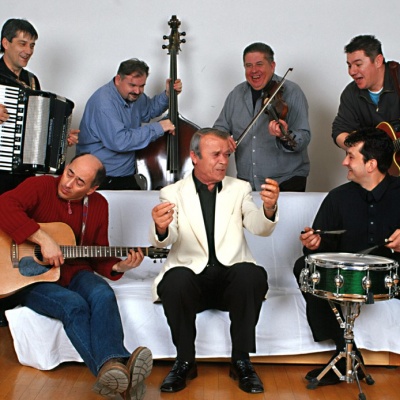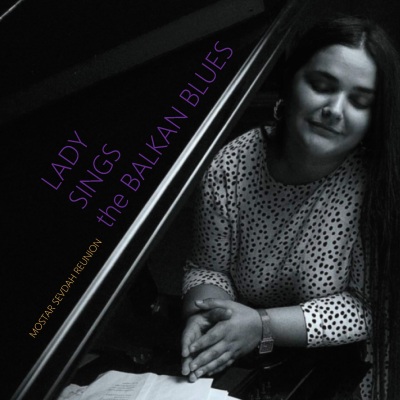
Mostar Sevdah Reunion
波斯尼亚乐队Mostar Sevdah Reunion——”战火肆虐的土地上的明珠“,已经凭借他们的两张出色专辑在世界音乐的版图上划下了自己的位置(本资料译自国外网站,时间较早,如今已有四张专辑了)——一张是波斯尼亚的sevdah民歌,而另一张则是与世界上最著名的吉普赛歌手 Šaban Bajarmovic合作的《吉普赛传奇》(A Gypsy Legend)。Sevdah是一种波斯尼亚传统音乐形式,已有300多年的历史。这个名词来源于阿拉伯语,意为”爱、欲望或狂欢“。乐队的创始人Dragi Šestic说:”Mostar市就代表着sevdah——sevdah最杰出的民谣诗人都生在Mostar,它深深地扎根在我们这座城市。“ 2000年,Mostar Sevdah Reunion参加了阿姆斯特丹根源音乐节和比利时斯芬克斯音乐节上的演出,之后的2001年,乐队还在德国的Stimmen-Lorach和著名的尼斯爵士音乐节上进行了表演。在那个名为”B.B.King和他的朋友们——全世界的布鲁斯“ 的特别的夜晚,Mostar Sevdah Reunion在五万观众面前将巴尔乾蓝调引入了美国布鲁斯音乐根源。主唱Ilijaz Delic,手风琴手和单簧管手Mustafa Šantic,小提琴手Nedjo Kovacevic和吉他手Mišo Petrovic与B.B.King、 Van Morrison、Dr. John、Bill Wyman、 Keb Mo、Marva Wright世界级布鲁斯音乐大师同台献艺,演绎十分出色。 2003年,Mostar Sevdah Reunion又和南斯拉夫歌后Ljiljana Buttler一起将他们的音乐带到了英国伦敦的巴比肯中心和纽卡斯尔的Newgate大街、提耳堡(荷兰)的国际吉普赛音乐节、杜塞尔多夫(德国)的Moers国际爵士音乐节、阿尔梅利亚(西班牙)世界音乐节、斯德哥尔摩的Sodra剧场、奥斯陆世界音乐节、海牙的Crossing Borders音乐节等等,每场演出完毕,当地观众都长时间起立热烈鼓掌。MSR乐队已成为巴尔乾地区和巴尔乾音乐的象征。 英国著名晚报Evening Standard曾经幽默地评论道:'他们的现场演出绝对不容错过,那简直是一个奇迹般的Monster Sevdah Reunion!" 转载一篇来自龟壁茶居的精彩文章《莫斯塔:波士尼亚的月光下》,向原作者表示感谢: 一场残酷的内战,让数十万人如虀粉般灰飞湮灭,但同时,也催生了波士尼亚当代最杰出的吉普赛乐队。 这是Mostar Sevdah Reunion的故事。 「sevdalinke」,是成形於颚图曼帝国统治时期的波士尼亚民间音乐,该字源自土耳其文的「sevdah」,这个土耳其字又是借自阿拉伯文,解为「爱恋、嗔痴、欲望」之意。而传统东欧吉普赛音乐,素来以熊烈、大块的香豔殇情著称。当上述两者遇上20世纪末欧洲最残酷的一场战争,没有人会怀疑,其酝积的能量足堪催生当代最撼动人心的音乐。 战争往往是伟大艺术的催生者。 波士尼亚乐队Mostar Sevdah Reunion,这个包含波士尼亚裔、塞尔维亚裔、克罗埃西亚裔、吉普赛裔的伟大乐队,正是在这样的背景下,诞生於波士尼亚战争末期的Mostar市。 然而,笔者绝对没有利用波士尼亚战争将这个乐队浪漫化的意图,我们还是得回头检视sevdalinke的发展,才能体认到Mostar Sevdah Reunion的杰出。 Sevdalinke是土耳其与南方斯拉夫音乐交融下的产物。然而由於波士尼亚境内各城镇在历史、地理环境上的迥异,各城镇都发展出了拥有自身特色的sevdalinke音乐,以波士尼亚南方大镇Mostar为例,长久以来被传唱为地下国歌的情诗「Emina」,主旋律中借用了大量的土耳其音,但节奏行进与间奏部份却完完全全是斯拉夫风格。文章最下面的连结部分提供了20世纪最伟大的sevdalinke歌者之一 ─ Himzo Polovina的试听网页,里面就可以听到"Emina",看倌可善加利用。 传统的sevdalinke歌曲中,土耳其乐器saz (一种源自中亚的长颈琴) 是歌者最标准的配备。不过这种乐器在今天的波士尼亚已经式微,取而代之的,是东欧普遍流行的单簧管、手风琴、小提琴、吉他等等,这些乐器的炫技与华丽感异於saz悲凉的音质,也进一步丰富了今日sevdalinke的色彩。 我们必须理解,传统sevdalinke之所以标榜素秀典雅 (请参见Himzo Polovina),是因为其情诗的本质,而这种情诗又是19世纪中期,南方斯拉夫民族向往当时法国浪漫主义的产物 (南方斯拉夫的国族观念,也是同时萌芽),因此,当吉普赛歌手所强调的炽烈、灼烧、黯殇特质与sevdalinke相遇,自然迸生出更教人兴奋的化学变化。 就听听Mostar Sevdah Reunion第一张专辑的第一曲吧。「Ašik Osta'na te Oči」(在你的双眼中‧我坠入爱河),起首30秒那土耳其式的长声拜赞、第二曲「Mujo Kuje Konje po Mjesecu」(月下系马,本文背景音乐) 东欧吉普赛式的手风琴超高速切分音。不仅如此,发行的荷兰唱片公司World Connection为了增加唱片的卖相,特别请出了镇厂之宝 ─ 马其顿的吉普赛歌后Esma Redžepova ─ 献唱两曲,听了不禁大叹,Mostar Sevdah Reunion的乐队班底比起Esma Redžepova 的亡夫实在高段太多! 在波士尼亚战争期间,Ilijaz Delić与众乐队班底曾在某次烛光音乐会后聊到:「当战争结束,这世界将会认识sevdah音乐。」是呀,今天,Mostar Sevdah Reunion不但是波士尼亚向世人宣扬不同族裔和平共处的典范,更是新一代sevdahlinke,以及吉普赛音乐的骄傲。 Mostar Sevdah Reunion is exquisite group of Artists sharing the same passion. Some might say that they live for Sevdah and that could be the only cause of their existence. To decode and to represent traditional music from Bosnia and Herzegovina, Sevdah is more than 400 years old, in a best light, was and still is difficult task to cope with. Despite all obstacles, MSR kept going. The story begins in 1993 when Dragi Sestic, Producer and former of the band, recorded an audiocassette with a couple of tracks that was distributed in limited edition amoung their friends. Those were the times of war in Balkans and the reason for recording was just a getaway episode to forget for a one single moment all atrocities and suffering. Then, they gave promise that "the whole world will know about Sevdah" one day when war comes to an end. They fulfilled the promise and recorded their first album in 1998. Since, the album CD "Mostar Sevdah Reunion" was recorded in Mostar, they did not stop fascinating the audience wherever they go. Diversity in musical backgrounds and individual virtuosity in a collective that never performed two identical gigs in a row makes them unique on the World Music scene. Working and recording with Saban Bajramovic "A Gypsy Legend" , Ljiljana Buttler "The Mother of Gypsy soul", Esma Redzepova "The Queen of Gypsies", Boban Markovic , Naat Veliov and Amira were recorded to show variety of Balkans music an to give a respect to the finest and uncompromised authors of genuine Gypsy music. This year will also bring new and fresh ideas from the MSR manufacture. Until then, take care and see you soon.





